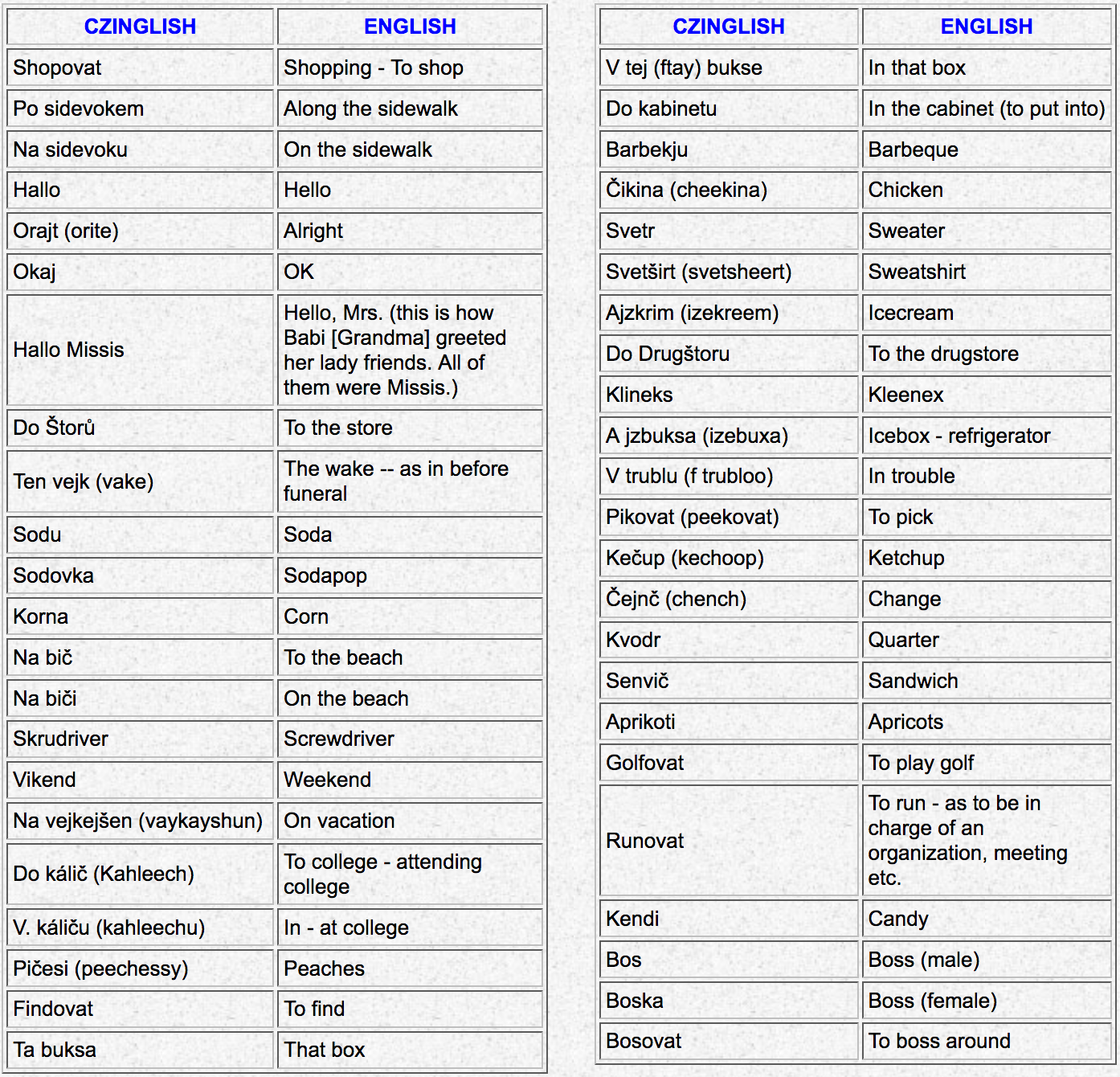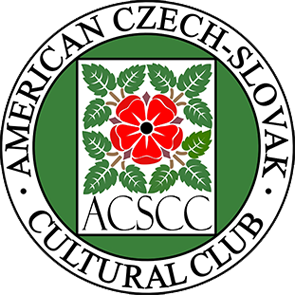Editors note: This article was passed down through our club (see credits at the end) over the years. Unfortunately, no one knows who originated the article or when it first appeared. I do know that I remember hearing “Czinglish” used by my parents, grandparents, relatives and neighbors when I was a boy growing up in Berwyn, Illinois during the 1940’s. I really chuckled as I first read this article, as did my wife, and my Dad, who is now 96 years old. Dad really got a kick out of it. He remembers using it with his parents and grandparents. – Bill Stupka, ACSCC 4/9/01
CZINGLISH
Author Unknown
Many of us, growing up in the old Czechoslovakian neighborhoods in various areas around the United States, have developed a unique vocabulary called Czinglish.. Czinglish is a combination of Czech and English words that we or our friends and relatives use in conversation. These words are very versatile and interchangeable, and the people using them would swear that these words were actually of Czech or English origin (depending on who they were speaking with). As our parents or grandparents were learning to speak English, certain words stuck in their minds especially words that could be”Czecho-sized” by simply adding a Czech suffix or using a Czech modifier with the word. It made conversations flow easier and our parents and grandparents could still speak their native tongue and practice their English at the same time. What developed, as a result was a new language — Czinglish. Here are some examples of Czinglish vocabulary and the English “translations”. See how many you recognize. Some of the words are spelled phonetically and some are spelled simply as they sound. After all, there is no Czinglish Dictionary – yet!
I’m sure there are quite a few more Czinglish words that come to mind. Perhaps someday there will be a dictionary for this versatile language. The following is a little tale that utilizes the Czech and Czinglish vocabulary, much like many of us would use it.


A Little Story in Czinglish
Babi a ja jsme šli shopovat. Jsme šli na sidvoku a podkali jsme Missis Knedlik. Hallo, Missis, jak jse máte?”, řekla Babi. Missis Knedlik řekla, “Hallo, Missis, ja jsu orajt”. Babi Jse ptala, “Pujdete na ten vejk, Missis?” Missis odpovedela, “No, mi jdeme do Michigan na vikend. Budeme pikovat pičesi”. “Okej, tak se uvidime zas, soon. Bye-Bye.” “Okey, tak bye.”
Tak jsme šli do štoru. Tam Jsme na shopovali hodně. Mi Jsme koupili sodu, kornu, aprikoti, dvě čikeni, a nějaky ten ajzkrim. Jsme chteli koupit Kecup, ale jsme ho nemohli findovat. Pak jsme šli do drugstoru koupit Klineks. Jsem chtěla nějaki kendi, ale Babi neměla žadni čejnč. Tak jsme šli domu a dali jsme naše groseri do ajzbuski a do kabinetu. Babi nam dala senviče a sodu a potom jsme šli na bič.
English Translation
Grandma and I went shopping. While walking on the sidewalk, we met Mrs. Knedlik. Grandma said, “Hello, Mrs. how are you?” Mrs. Knedlik said “Hello, Mrs., I’m alright.” Grandma asked “Are you going to the wake, Mrs?” Mrs. replied “No, we’re going to Michigan for the weekend. We’ll be picking peaches.” “OK, well, we’ll see each other again soon. Bye-Bye.” OK, bye”.
We went to the store and did a lot of shopping. We bought soda, corn, apricots, two chickens and some ice cream. We wanted to buy ketchup, but we couldn’t find it. Then we went to the drugstore to buy Kleenex. I wanted some candy, but grandma didn’t have any change. So we went home and put all our groceries in the refrigerator and in the cabinet. Grandma gave us some sandwiches and soda and then we went to the beach.
Those of us who speak fluent Czinglish would not have much of a problem figuring out this tale. But if a native Czechoslovakian would read this, he’d have a hard time with the “Czinglish” words. I wonder how many of these words they now use in the “old country”?
Thank you to Cathy Fremut, Miami, Florida for providing a photocopy of an old carbon copy of this article. Cathy, had obtained it some time ago from Anne Callahan, a fellow American Czech-Slovak Cultural Club member. The original copy had the name, Marie A. Howe, Port Charlotte, Florida, stamped on it. The author is unknown,
The copy was scanned and then fed through an optical character reader to produce this version. It needed a little cleaning up, however an effort was made to keep it is as close to the original as possible. All of the diacritical marks used in the original are included. I hope that you can see them, as there is a bit of question about using diacriticals on the internet. Bill Stupka, ACSCC – 4/2/01
